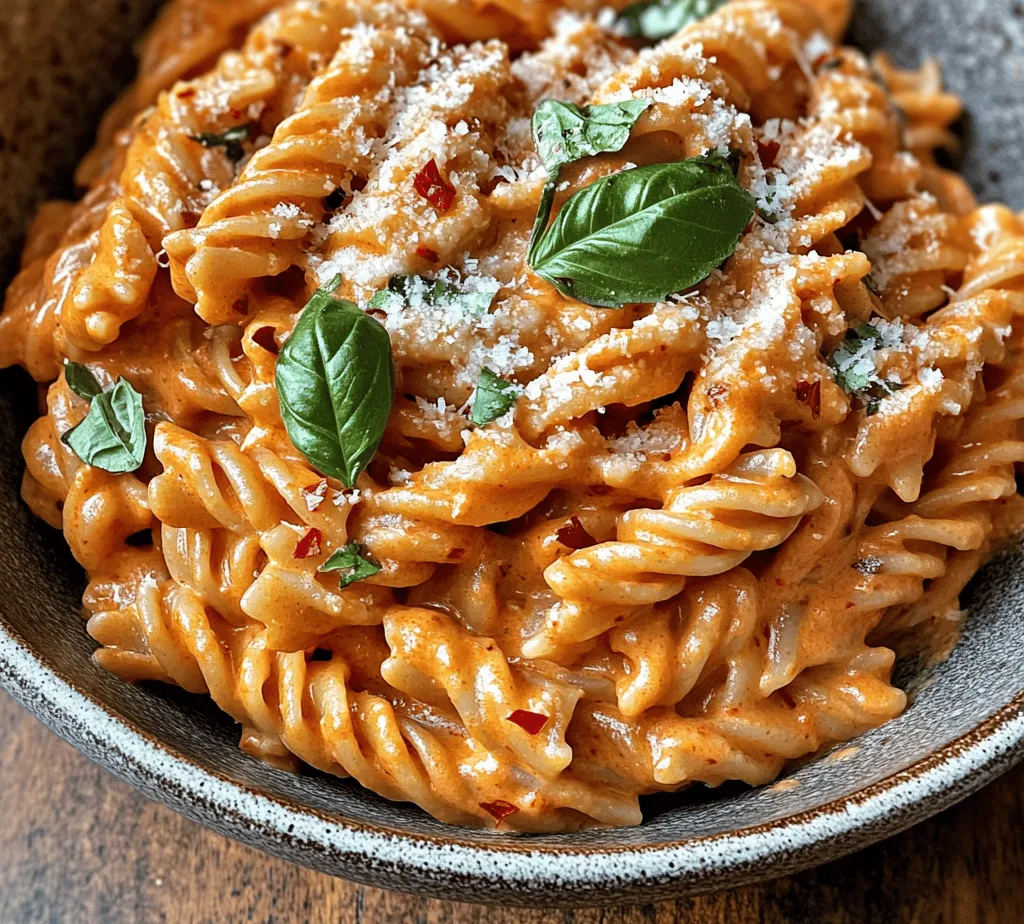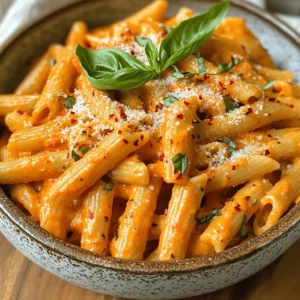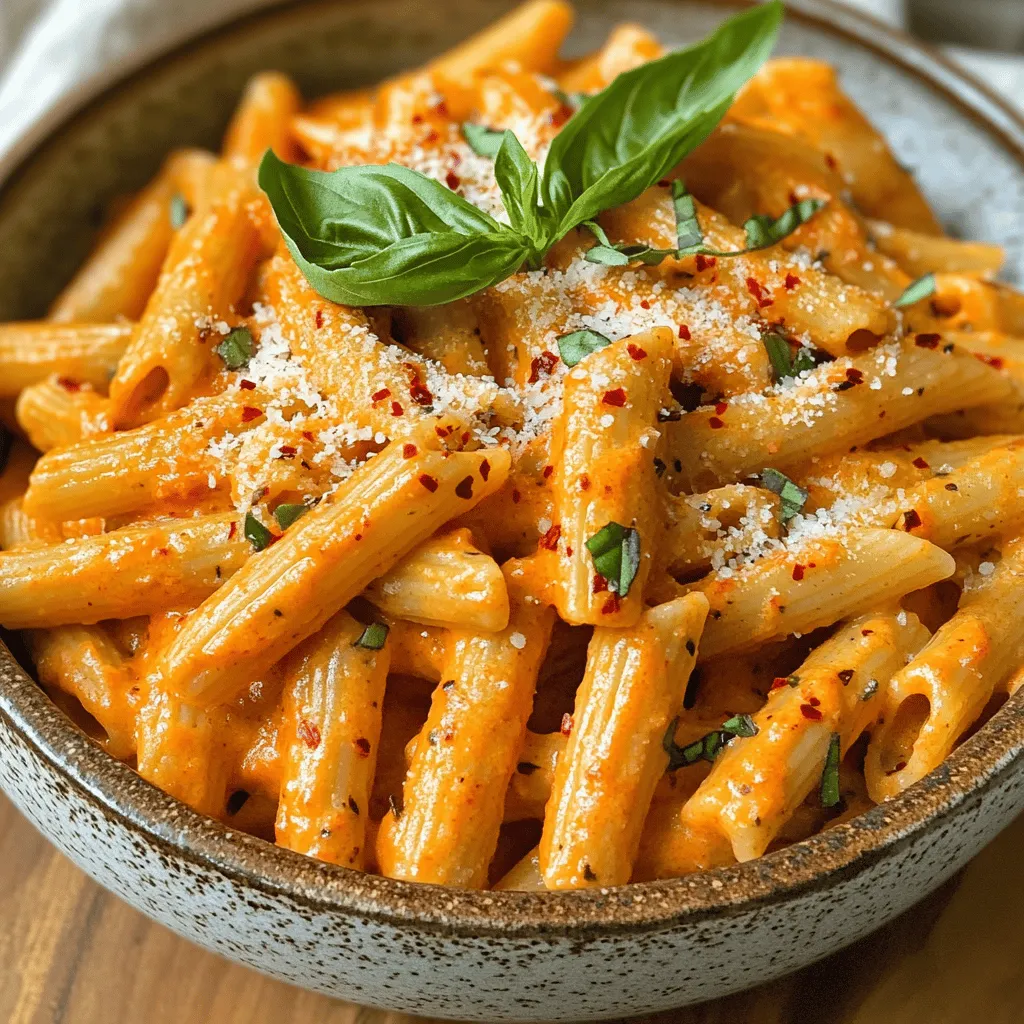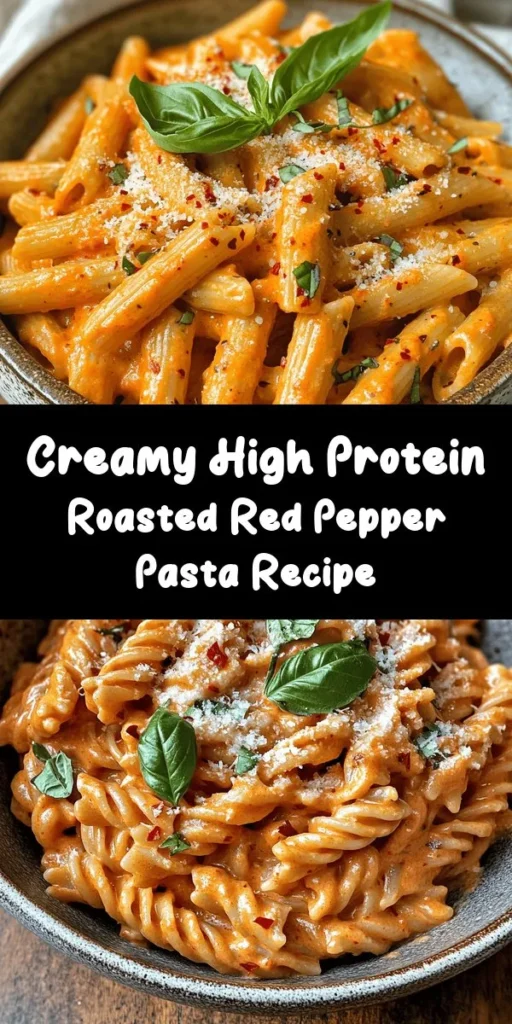Introduction
In recent years, high-protein diets have gained significant popularity among health enthusiasts, athletes, and anyone looking to improve their overall well-being. Emphasizing the intake of protein-rich foods can lead to a variety of benefits, including enhanced muscle repair, improved satiety, and better metabolic function. Whether you’re an avid gym-goer or simply someone seeking to incorporate more nourishing meals into your diet, understanding the role of protein in your food choices is crucial.
One delectable way to embrace a high-protein lifestyle is through the recipe for High Protein Creamy Roasted Red Pepper Pasta. This dish not only satisfies your craving for a comforting, creamy pasta but also packs a nutritious punch, making it a wholesome option for anyone looking to boost their protein intake. The creamy texture and vibrant color of roasted red peppers create a visually appealing and flavorful dish that can easily become a staple in your weekly meal rotation.
The Importance of Whole Food Ingredients
When it comes to crafting flavorful and nutritious meals, the choice of ingredients plays a pivotal role. Whole food ingredients are not only better for your health, but they also elevate the taste of your dishes. In this recipe, the combination of roasted red peppers, whole wheat pasta, and protein-rich dairy products results in a dish that is as wholesome as it is delicious. By opting for natural ingredients, you can ensure that you’re getting essential vitamins and minerals that contribute to your overall health while also enhancing the flavor profile of your meals.
Versatility is another hallmark of High Protein Creamy Roasted Red Pepper Pasta. This dish caters to a variety of dietary preferences, making it suitable for vegetarians and those looking to reduce their meat consumption. The creamy sauce can be modified using different protein sources like cottage cheese or Greek yogurt, allowing you to tailor the recipe to your specific nutritional needs and taste preferences.
Understanding the Benefits of High Protein Meals
To fully appreciate the merits of high-protein meals, it’s essential to understand the role protein plays in our bodies. Protein is a macronutrient that serves as the building block for muscles, tissues, enzymes, and hormones. Incorporating an adequate amount of protein in your diet is vital for muscle repair and growth, particularly for those engaged in physical exercise.
In addition to muscle health, a protein-rich diet can help with weight management. High-protein meals tend to be more satisfying, helping to curb hunger and reduce snacking between meals. This can lead to lower overall calorie intake and support weight loss or maintenance goals.
The Health Benefits of Whole Wheat Pasta
Whole wheat pasta is a fantastic alternative to regular pasta, offering a wealth of nutritional benefits. Unlike its refined counterpart, whole wheat pasta retains the bran and germ of the wheat grain, making it a good source of dietary fiber. Fiber is essential for digestive health and can aid in maintaining stable blood sugar levels. The increased fiber content also contributes to a feeling of fullness, making whole wheat pasta a smart choice for those looking to manage their weight.
In addition to fiber, whole wheat pasta provides essential vitamins and minerals, such as B vitamins, iron, and magnesium, which play crucial roles in energy production and overall health. Choosing whole wheat pasta for this recipe not only enhances its nutritional profile but also adds a delightful nutty flavor and chewy texture to the dish.
Nutritional Profile of Key Ingredients in the Recipe
Roasted Red Peppers
Roasted red peppers are a star ingredient in this recipe, offering a wealth of vitamins and antioxidants. Rich in vitamin C, they help support the immune system and promote healthy skin. Furthermore, roasted red peppers contain various phytonutrients, which may have anti-inflammatory properties. Their natural sweetness and vibrant color make them an excellent choice for adding flavor and nutrition to a wide range of dishes.
Cottage Cheese vs. Greek Yogurt
Both cottage cheese and Greek yogurt are excellent sources of protein, making them ideal candidates for this creamy pasta dish. Cottage cheese typically contains around 25 grams of protein per cup, while Greek yogurt boasts slightly more, with around 20 grams per cup. The choice between the two can come down to personal preference in texture and taste. Cottage cheese offers a chunkier consistency, while Greek yogurt provides a smooth and creamy finish. Additionally, Greek yogurt is often lower in calories and fat compared to cottage cheese, which may appeal to those monitoring their caloric intake.
Olive Oil
Olive oil is another key ingredient in this recipe, known for its heart-healthy properties. Rich in monounsaturated fats, olive oil can help lower bad cholesterol levels and promote overall cardiovascular health. Furthermore, it is loaded with antioxidants, particularly vitamin E, which plays a role in reducing oxidative stress in the body. When used in cooking, olive oil enhances the flavor of the roasted red peppers and garlic, creating a rich and satisfying sauce.
Garlic
Garlic is a staple in many kitchens, celebrated not only for its robust flavor but also for its numerous health benefits. Known for its potential anti-inflammatory and immune-boosting properties, garlic can contribute to overall well-being. Additionally, it adds depth and flavor to the sauce, creating a delightful aromatic experience that complements the roasted red peppers.
Red Pepper Flakes
For those who enjoy a bit of heat, red pepper flakes are a fantastic addition to this dish. They allow you to adjust the spice levels to your preference, adding a kick that enhances the overall flavor profile. Beyond their flavor contribution, red pepper flakes contain capsaicin, which may have metabolism-boosting properties.
Italian Seasoning
Italian seasoning is a blend of various herbs that can elevate the taste of your pasta dish. Typically composed of basil, oregano, thyme, and rosemary, this seasoning adds a fragrant and savory quality to the creamy sauce, tying all the flavors together harmoniously.
Fresh Herbs for Garnish
To finish off your High Protein Creamy Roasted Red Pepper Pasta, consider garnishing with fresh herbs such as basil or parsley. Not only do they add a burst of color, but they also contribute additional flavor and nutritional benefits. Fresh herbs are rich in vitamins and antioxidants, which can enhance the healthfulness of your meal.
Ingredient Breakdown
Whole Wheat Pasta
Choosing whole wheat pasta for this recipe is a step towards a more nutritious meal. Whole wheat pasta is made from whole grain flour, meaning it retains its natural fiber and nutrients. When cooking whole wheat pasta, be sure to follow the package instructions, as it may require a slightly longer cooking time compared to regular pasta. Aim for al dente texture for the best results, as this adds a pleasant chewiness to the dish and helps to retain the pasta’s nutritional value.
Roasted Red Peppers
You can use jarred roasted red peppers for convenience, but making your own is simple and allows for a fresher flavor. To roast red peppers at home, place whole peppers under the broiler or over an open flame until the skin is charred and blistered. Once roasted, place the peppers in a bowl covered with plastic wrap to steam for about 10 minutes. This makes peeling off the skin easier. After peeling, chop the peppers into strips or chunks to be blended into the sauce.
Cottage Cheese
Cottage cheese is not only creamy but also a powerhouse of protein. When selecting cottage cheese, opt for low-fat or non-fat varieties if you want to keep the dish lighter. If you prefer a smoother sauce, blending the cottage cheese before mixing it with the other ingredients can create a velvety texture. If you’re looking for alternatives, consider using ricotta cheese for a richer flavor or silken tofu for a dairy-free option.
Parmesan Cheese
Parmesan cheese adds a savory depth to the dish, enhancing the overall umami flavor profile. When choosing Parmesan, look for freshly grated options for the best taste. If you’re looking for a dairy-free alternative, nutritional yeast can provide a cheesy flavor without the dairy.
Olive Oil
When selecting olive oil, extra virgin olive oil is the best choice, as it is the least processed and retains the most nutrients and flavor. Use it to sauté garlic and create a luscious sauce that coats the pasta beautifully.
Garlic
Fresh garlic cloves are recommended for maximum flavor. Mince the garlic finely and sauté it in olive oil until fragrant, but be careful not to burn it, as this can lead to bitterness.
Red Pepper Flakes
Adjust the amount of red pepper flakes based on your heat preference. Start with a small pinch and increase it as desired, tasting along the way to achieve the perfect balance.
Italian Seasoning
You can either use pre-mixed Italian seasoning or create your own blend using dried basil, oregano, thyme, and rosemary. This seasoning will enhance the sauce with a traditional Italian flavor profile.
Fresh Herbs for Garnish
Chopped fresh basil or parsley adds a pop of color and freshness to your finished dish. These herbs not only enhance the presentation but also provide additional nutritional benefits, making your meal even more wholesome.
With these carefully chosen ingredients, your High Protein Creamy Roasted Red Pepper Pasta will be a nutrient-dense dish that satisfies both your taste buds and your dietary needs. In the next section, we’ll dive into the step-by-step instructions on how to prepare this delicious pasta dish.

Step-by-Step Cooking Instructions
Cooking the Pasta
To begin your High Protein Creamy Roasted Red Pepper Pasta, start by bringing a large pot of salted water to a boil. The salt is essential as it seasons the pasta while cooking. Once the water is at a rolling boil, add your choice of high-protein pasta, such as lentil or chickpea pasta. This provides a nutritious boost while maintaining a satisfying texture.
For the perfect al dente pasta, cook according to the package instructions but check for doneness a minute or two before the time is up. Al dente means the pasta should be tender but still have a slight bite. Once cooked, reserve about a cup of the pasta cooking water, which will be useful for adjusting the sauce’s consistency later. Drain the pasta in a colander and set it aside, ensuring that you leave some steam in the pasta to help with the overall dish warmth.
Making the Sauce
While your pasta is cooking, you can prepare the creamy roasted red pepper sauce. Start by roasting red peppers. If you’re using jarred roasted peppers, you can skip this step. If roasting fresh peppers, place them on a baking sheet and broil them in the oven for about 15 minutes until the skins are charred and blistered. Once done, transfer them to a bowl and cover with plastic wrap for about 10 minutes, allowing the steam to loosen the skins for easier peeling.
Once cooled, peel off the skins and remove the stems and seeds. Add the roasted peppers to a blender or food processor, along with a cup of Greek yogurt or a dairy-free alternative for a vegan version, a tablespoon of olive oil, a clove of garlic, and a pinch of salt and pepper. Blend until smooth and creamy, adjusting the seasoning to taste. If the sauce is too thick, add a bit of the reserved pasta water to reach your desired consistency.
Combining Pasta and Sauce
With your pasta cooked and your sauce ready, it’s time to bring them together. In a large skillet, combine the drained pasta with the roasted red pepper sauce over medium heat. Gently toss to coat the pasta evenly. This step is crucial; you want to ensure that every strand of pasta is enveloped in the creamy sauce. If the pasta seems dry, gradually add more reserved pasta water until you achieve a silky texture that clings to the pasta.
Heating Through
After mixing the pasta and sauce, allow the dish to heat through for about 2-3 minutes. Be careful not to overcook as this can lead to a loss of creaminess. Stir continuously to ensure that the sauce does not stick to the bottom of the skillet. Once heated, remove from the heat and serve immediately.
Customization Options for Enhanced Nutrition
This High Protein Creamy Roasted Red Pepper Pasta can be easily customized to fit your dietary needs and preferences.
– Adding Protein: For an extra protein punch, consider adding grilled chicken or shrimp to the dish. Simply season the protein of your choice with salt, pepper, and a bit of olive oil, then grill or sauté until cooked through. Toss the protein with the pasta and sauce before serving.
– Vegetarian and Vegan Substitutions: To keep the dish vegetarian, the original recipe is already suitable, but you can also add roasted vegetables for added flavor and nutrients. For a vegan option, substitute Greek yogurt with a plant-based yogurt or cashew cream.
– Incorporating Seasonal Vegetables: Feel free to toss in seasonal veggies like spinach, zucchini, or broccoli for added nutrition and color. They can be sautéed in the same skillet just before you add the pasta for a one-pan meal.
– Dietary Restrictions: If you need to avoid gluten, opt for gluten-free pasta alternatives made from brown rice, quinoa, or lentils. These options not only cater to gluten sensitivities but also maintain the high protein content of the dish.
Serving and Presentation Ideas
Presentation is key when serving your High Protein Creamy Roasted Red Pepper Pasta. Here are some tips to make your dish visually appealing:
– Plating: Use a large pasta bowl or individual plates. Twirl the pasta into a nest shape using a fork and spoon for an elegant look. Drizzle a bit of olive oil on top and sprinkle with freshly chopped parsley or basil for a pop of color.
– Complementary Side Dishes: To enhance your meal, consider serving a fresh green salad with a light vinaigrette or roasted vegetables. Garlic bread or whole-grain breadsticks also pair wonderfully with this creamy pasta.
– Beverage Pairings: A crisp white wine, such as Sauvignon Blanc, complements the flavors beautifully. If you prefer non-alcoholic options, sparkling water with a slice of lemon or herbal teas like chamomile or mint can provide a refreshing balance to the dish.
Nutritional Analysis of the Dish
Understanding the nutritional benefits of your meal is essential, especially when it comes to high-protein options. Here’s a breakdown of the nutritional content per serving of High Protein Creamy Roasted Red Pepper Pasta:
– Calories: Approximately 400-500 calories
– Protein: 20-25 grams (depending on the type of pasta and added protein)
– Fats: 10-15 grams
– Carbohydrates: 60-70 grams
When compared to traditional creamy pasta dishes, this recipe stands out due to its higher protein content and lower saturated fats, especially when using Greek yogurt instead of heavy cream. The use of whole grain or legume-based pasta increases fiber and essential nutrients, making this a health-conscious choice without sacrificing flavor.
Conclusion
In summary, the High Protein Creamy Roasted Red Pepper Pasta is not only a delightful dish bursting with flavor but also a nutritious addition to your meal rotation. Its versatility allows for numerous variations and substitutions, making it suitable for various dietary needs. This recipe encourages creativity in the kitchen while promoting a balanced diet rich in protein.
We invite you to try this recipe and explore the endless possibilities it offers. Whether you stick to the original ingredients or customize it to your liking, this dish is sure to become a favorite in your household. Embrace the benefits of high-protein meals and enjoy the rich, creamy flavors of this delightful pasta dish.



